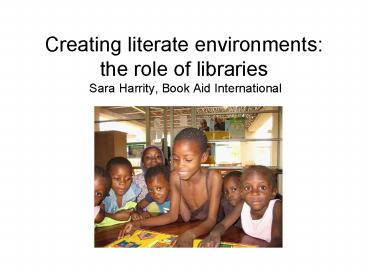Creating literate environments: the role of libraries Sara Harrity, Book Aid International - PowerPoint PPT Presentation
1 / 21
Title:
Creating literate environments: the role of libraries Sara Harrity, Book Aid International
Description:
Support for community libraries, schools, universities, local books / info sector ... libraries provide a cost-effective solution, offering free and open access ... – PowerPoint PPT presentation
Number of Views:40
Avg rating:3.0/5.0
Title: Creating literate environments: the role of libraries Sara Harrity, Book Aid International
1
Creating literate environments the role of
libraries Sara Harrity, Book Aid International
2
Introducing Book Aid International
- 50 years experience supporting readers and
learners - Support for community libraries, schools,
universities, local books / info sector - Partnerships in 17 countries in sub Saharan
Africa and Palestine - Programmes incorporate books / info support,
capacity building and advocacy
3
Commonwealth Links
- Majority of programmes in the Commonwealth
- Joint project with Commonwealth Pharmaceutical
Association - up to date pharmaceutical
information for health workers - Commonwealth Secretariat sponsorship and
distribution of a recent research paper - Association of Commonwealth Universities and
Commonwealth Foundation funds Exchanges and
Training Programme - COMLA connections, planned CCEM attendance
4
Literacy challenges
- 2006 EFA GMR highlights
- One billion illiterate adults worldwide, majority
are women - Need to scale up youth and adult literacy
programmes - Poor literate environments
5
Literate environments
- 2006 EFA GMR investment in literacy as a human
right - Need to create an environment that helps sustain
and develop literacy - Whats needed? reading materials, newspapers,
posters, a range of simple and accessible written
information
6
The challenge of creating literate environments
- Significant investment needed to create literate
environments - Greater policy engagement to look at literate
environments and enhancing educational quality,
both of which are central to education policy - Wider sharing of learning about projects that are
already strengthening literate environments
7
What is the role of libraries?
- Libraries are valuable throughout our lives, for
research, for news, for practical information and
for leisure - Value of libraries perhaps even stronger in
developing countries where access to information
is much more limited - Evidence shows libraries support literacy and
learning
8
Libraries need more support
- A UNESCO/ADEA report for the 2000 Education For
All assessment found a majority of schools in
Africa do not have a school library and where one
exists it is often no more than a few shelves
of outdated and worn out material, inadequately
staffed - Public libraries are similarly neglected there
are just 36 branches in Kenyas national library
network, to serve a population of 32 million
9
The evidence for libraries in schools
- SACMEQ 2000-1 surveys of reading ability in seven
countries in sub-Saharan Africa identify poor
reading ability among a majority of learners - The researchers link this problem to book
shortages for instance in Tanzania just 20 of
primary schools have any kind of school library - The reports recommendations include improving
pupils access to books through better school and
classroom libraries, increased book borrowing and
encouraging pupils reading
10
The evidence for libraries in the community
- To maintain literacy people must be able to
continue to access reading materials libraries
provide a cost-effective solution, offering free
and open access - Popularity of libraries is a good measure of
their usefulness to communities on a recent
visit to Kenya BAI staff noted several libraries
with 200 visitors a day and one which had nearly
500 users each day - Community libraries have wide-ranging impact
across social, cultural and educational fields
this can be difficult to measure
11
(No Transcript)
12
Community information
- Chiwamba Community Information Centre
- Rural resource centre in Malawi
- Makes use of two-way information flows to ensure
that both external information resources and
local knowledge are shared and exchanged within
the community - Engages with the community to provide appropriate
resources and to ensure high levels of
participation and use - Wide range of services on offer including
audio-visual, training, events and support for
adult literacy groups
13
Chiwamba Community Information Centre
14
(No Transcript)
15
(No Transcript)
16
(No Transcript)
17
Promoting access
- Mobile services such as motorbike book boxes, the
camel mobile library - Special services eg for blind, HIV/AIDs sections,
opening times dedicated female readers - Community links most teacher-librarians have
had little or no training, community librarians
can offer support through linking with local
schools and offering training in reading
promotion
18
Relevant resources
- Libraries can offer good access to resources that
support formal education and help improve
learning outcomes - Supplementary materials help to equip learners
to be critical readers and acquire
information-age literacy - Need for basic and locally relevant information
materials and books and pamphlets in local
languages as well as in English - Resources in print and electronic form enhance
knowledge and skills development
19
(No Transcript)
20
Benefits for library users
- Maintain and develop literacy skills learnt in
the classroom - Access knowledge to improve lives and livelihoods
- Learn about health issues and be better able to
protect families from sickness - Become aware of democratic rights
- Acquire skills to help gain employment
- Reinforcing cultural identity
- Route to self development - independent critical
thinking
21
The way forward
- We believe libraries have a crucial role to play
in creating and sustaining literate environments - In a context where strong literate environments
are created there is much greater opportunity for
i) enhancing educational quality and ii) creating
opportunities for lifelong learning - Need to work together to influence policy































